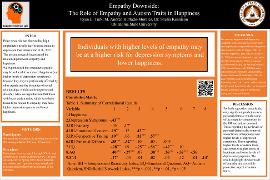| dc.identifier.citation | Turk, R. E., & Kennison, S. (2023, April 18). Empathy downside: The role of empathy and autism traits in happiness. Poster session presented at the Oklahoma State University Undergraduate Research Symposium, Stillwater, OK. | |
| dc.description.abstract | Prior research has shown that high empathetic people may be more prone to depression than others (Yan et al., 2021). The present research investigated the relationship between empathy and happiness. We hypothesized that empathetic people may be vulnerable to reduced happiness (and higher levels of depression symptoms) because they may be particularly affected by other people and the dynamics of social relationships, which can be negative and stressful. Also, we hypothesized that those with lower autism traits, which have been found to be related to empathy, may have higher depression systems and lower happiness. Those with more autism traits tend to report lower levels of empathy and higher happiness. We tested the hypothesis in an online survey with 204 undergraduates (105 men, 99 women). We assessed happiness (Oxford Happiness Questionnaire, Hills & Argyle, 2002), depression symptoms (CESD-R, Eaton, Muntaner, Smith, Tien, Ybarra, 2004), empathy (IRI, Davis, 1980; EQ, Baron-Cohen & Wheelwright, 2004), autism traits (AQ, Baron-Cohen, Wheelwright, Skinner, Martin, & Clubley, 2001), and social network size (SNI, Cohen et al., 1997). The results supported the hypotheses. In separate multiple regression analyses, we treated happiness and depression symptoms as dependent variables. For each analysis, we entered the following predictor variables simultaneously: sex, the four components of the IRI (empathetic concern, perspective taking, fantasy, and personal distress), the autism quotient, the empathy quotient, and the social network size. Both models were significant. For both models, the only significant predictors were personal distress, which is one of the empathy components in the IRI and autism quotient. Those reporting higher levels of personal distress also reported lower levels of happiness and higher levels of depression symptoms. Those recording higher levels of autism traits also recorded higher levels of happiness and lower levels of depression symptoms. The results highlight the downside of empathy and a possible protective aspect of autism traits. | |
